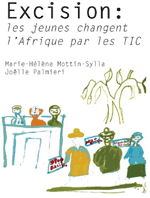Africa: Digital revolution against female genital mutilation
Published on Mon, 2011-08-22 07:29
Source: SlateAfrique, IDRC In the 10 years since the digital revolution got under way there have been more than 25 initiatives to fight female genital mutilation (FGM). The international campaign against this cruel practice, which is traditional in many parts of Africa, began 25 years ago but the spread of the new information and communication technologies (ICTs) in the continent has made it possible to raise real awareness about this problem among the general population. According to a study by Environnement et Développement du Tiers Monde (ENDA Tiers-Monde), member of the Senegalese group of Social Watch, this campaign originated among young people, who use these technologies the most. Two researchers, the Senegalese María-Hélène Mottin-Sylla (of ENDA) and Joëlle Palmieri (of the Centre for Black Africa Studies, in Bordeaux, France), examined this parallel phenomenon. Their final report (“Excision-Les jeunes changent l’Afrique par les TIC”) was published at the end of last year by the International Development Research Centre (IDRC) of Canada, and it has just been translated into English under the title “Confronting Female Genital Mutilation: The Role of Youth and ICTs in Changing Africa”. The study is aimed at academic and it explains the impact of ICTs on politics and the evolution of society. These researchers said that "In Africa the information society has brought about a new vision of development oriented to conceptual and methodological innovation, and to a re-definition of citizenship governance by gender. This is working against the prevailing patriarchal system, which alienates men, punishes women and marginalizes young people … In this it was important to politicize the concept of citizenship, and this means creating a new development paradigm that is being born out of the digital revolution in Africa. This has made visible what was previous invisible. It emerged in various reports and reinforced the capabilities (of social organizations) in the field of gender and citizenship." According to the authors, a project called the Contribution of ICTs to the abandonment of FGM in French-speaking Africa (known by the acronym ICT-FGM) in particular constitutes "a visionary and illuminating initiative" that has shown, among other factors, "the skills of young people and their organizations" in how they have joined "the global digital society … By opting for mainstreaming and participation modalities made possible by the ICTs, the project has been able to execute and reinforce the practice of direct citizenship." Mottin-Sylla and Palmieri observed that, at least in French-speaking West Africa, ICTs are contributing to the abandonment of some practices, including FGM. The information society has developed very fast and it has brought about a total transformation of daily life and changed many beliefs. Young people were the first to become involved in the digital revolution and are therefore at the centre of the process of democratic and civic evolution. The authors explained that, as regards Internet, “Young people are concerned above all with gender issues, citizenship and eradicating FGM.” To understand how young Africans today feel about the phenomenon of mutilation, the two researchers worked with young men and women from Mali, Burkina Faso and Senegal. In this way they showed that “FGM is in the social and political sphere, and it compromises men as much as women in the human community. The horizon of this community is no longer limited to a local area or a people but extends to the global village.” ICTs influence young people and have made possible “the emergence and acceptance of a new political message based on human rights and citizenship”, and it has meant that over time this cruel practice will be abandoned. The publication of this report led the Mali association Gender and ICT, which is based in Bamako, to organize a forum about the subject based on the principle that ICTs are effective as they raise people’s awareness in the struggle to combat violence against women, and especially FGM.” More information:
|
SUSCRIBE TO OUR NEWSLETTER



